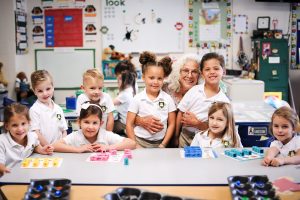Preparing Your Little One for Kindergarten
 By Susan Dodgion, Transitional Kindergarten Teacher
By Susan Dodgion, Transitional Kindergarten Teacher
Kindergarten is a fun, exciting adventure in which your child will build a foundation for future learning. There are steps you may want to take along the way before your little learner is ready to enter the world of formal education.
Here are just five ideas for guiding and nurturing readiness skills:
1. Talk and read with your child regularly.
Vocabulary, rhyme and phonemic awareness are developed when children are presented with the spoken and written language consistently. Current studies show the importance of eliminating or limiting screen time with preschool age children. Strong communication thrives when little ones are actively engaged in social interactions. It is also a great idea to end each day with a story, a lullaby and a night time prayer. You may find that this routine decreases the occurrences of nightmares or stressful sleep patterns.
2. Develop an Attitude of Gratitude with your young child.
You can do this by modeling an appreciation for the services and gifts that others share with you and your family. Writing thank you notes, sending pictures and other grateful gestures strengthen the child’s understanding of the importance of displaying thankfulness. Respect for the amount and use of material goods is also an important lesson for all of us to learn!
3. Encourage your little learner to complete small tasks.
This requires patience, but is well worth the effort. Young learners will grow in independence when given the opportunities to work through a difficult task or share ideas for solving a particular problem. “Try it again” is a wonderful motivator for the child involved in discovery learning.
4. Young children thrive when involved in a set routine.
Establishing routines and clarifying boundaries develop understanding of expectations and strengthen security and stability.
5. Children need opportunities for Free Play every day.
Stand back and enjoy the treat of watching your child. Observe your little one’s gifts and abilities and know that your little person is developing problem solving skills, conflict resolution techniques and creative abilities through non-directed play activities.
Down time should be considered an essential part of each day and family time is invaluable in the growth of emotionally healthy children. These magical moments help ready our children both for school and for life!